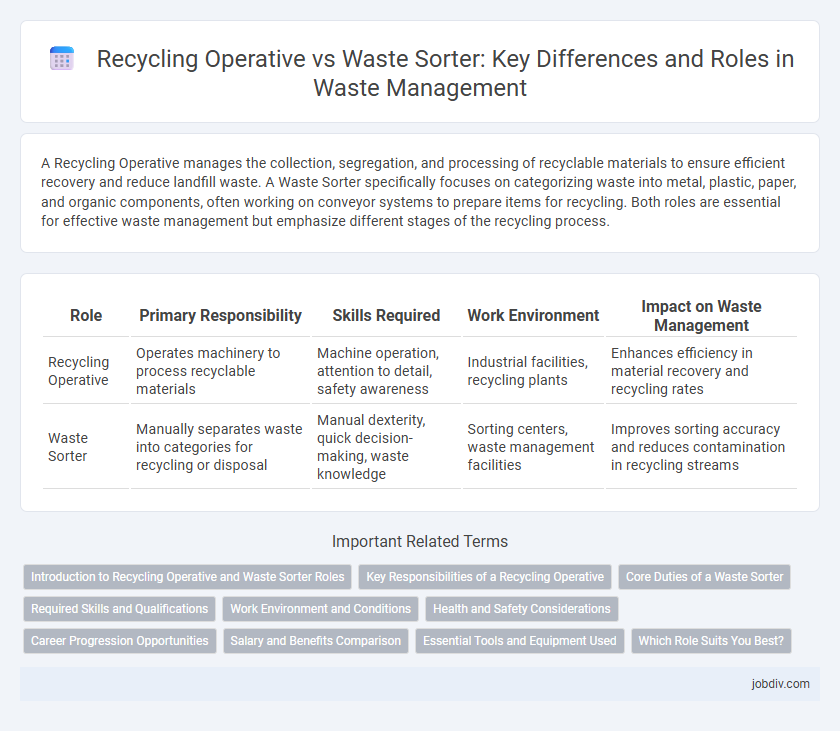A Recycling Operative manages the collection, segregation, and processing of recyclable materials to ensure efficient recovery and reduce landfill waste. A Waste Sorter specifically focuses on categorizing waste into metal, plastic, paper, and organic components, often working on conveyor systems to prepare items for recycling. Both roles are essential for effective waste management but emphasize different stages of the recycling process.
Table of Comparison
| Role | Primary Responsibility | Skills Required | Work Environment | Impact on Waste Management |
|---|---|---|---|---|
| Recycling Operative | Operates machinery to process recyclable materials | Machine operation, attention to detail, safety awareness | Industrial facilities, recycling plants | Enhances efficiency in material recovery and recycling rates |
| Waste Sorter | Manually separates waste into categories for recycling or disposal | Manual dexterity, quick decision-making, waste knowledge | Sorting centers, waste management facilities | Improves sorting accuracy and reduces contamination in recycling streams |
Introduction to Recycling Operative and Waste Sorter Roles
Recycling operatives manage the collection, processing, and preparation of recyclable materials, ensuring efficient recovery and reduction of waste sent to landfills. Waste sorters specialize in separating mixed waste into distinct categories like plastics, metals, and paper, enhancing the quality and purity of recyclables. Both roles are essential for optimizing recycling processes and minimizing environmental impact through effective waste management.
Key Responsibilities of a Recycling Operative
A Recycling Operative is primarily responsible for efficiently processing recyclable materials by operating machinery and manually sorting items to ensure contamination is minimized. Their key tasks include separating different types of waste such as plastics, paper, metals, and glass, while adhering to safety protocols and environmental standards. This role requires close collaboration with waste management teams to optimize recycling rates and reduce landfill dependency.
Core Duties of a Waste Sorter
A Waste Sorter is primarily responsible for manually separating recyclable materials such as plastics, metals, paper, and organic waste to ensure proper sorting and quality control within recycling facilities. Their core duties include inspecting incoming waste streams, removing contaminants, and preparing sorted materials for further processing or shipment. Accurate identification and segregation of materials directly impact the efficiency and effectiveness of the recycling process, supporting environmental sustainability goals.
Required Skills and Qualifications
Recycling operatives require skills in operating machinery, understanding material types, and adhering to health and safety regulations, often needing basic literacy and numeracy qualifications. Waste sorters focus on manual sorting skills, attention to detail, and physical stamina, with minimal formal qualifications typically required but benefiting from experience in waste management. Both roles demand knowledge of environmental regulations and a commitment to sustainability practices.
Work Environment and Conditions
Recycling operatives typically work in industrial facilities with advanced sorting machinery, often requiring adherence to strict safety protocols due to exposure to heavy equipment and fluctuating temperatures. Waste sorters operate primarily in waste management centers or recycling yards, manually separating materials in environments that can be noisy, dusty, and subject to odors. Both roles demand physical stamina and attention to hygiene, but recycling operatives often benefit from more automated systems that reduce direct contact with waste.
Health and Safety Considerations
Recycling operatives face health and safety risks such as exposure to hazardous materials and heavy machinery, requiring comprehensive training and protective equipment. Waste sorters must manage ergonomic challenges and airborne contaminants while adhering to strict hygiene protocols to prevent injury and illness. Both roles demand rigorous safety standards to minimize accidents and ensure worker well-being in waste management facilities.
Career Progression Opportunities
Recycling operatives often have clearer career progression pathways through specialized training in material recovery technology and environmental management, enabling advancement to supervisory or operational roles. Waste sorters, primarily engaged in manual separation tasks, may experience limited upward mobility unless they pursue additional qualifications in waste management or logistics. Investing in skill development and certifications in recycling processes significantly enhances promotion prospects within the waste management industry for both roles.
Salary and Benefits Comparison
Recycling operatives typically earn higher salaries than waste sorters, with average annual wages ranging from $30,000 to $40,000 compared to $25,000 to $32,000 for waste sorters. Recycling operatives often receive better benefits packages, including health insurance, retirement plans, and paid training programs, reflecting the increased skill requirements and responsibilities of the role. Waste sorters usually have more basic benefits and lower wage growth potential, highlighting the economic advantages of advancing to a recycling operative position.
Essential Tools and Equipment Used
Recycling operatives primarily utilize heavy-duty sorting belts, conveyor systems, and mechanical shredders to efficiently process recyclable materials, ensuring contamination is minimized. Waste sorters rely on handheld tools such as sorting gloves, magnetic separators, and manual picking tongs to identify and segregate waste streams accurately. Both roles utilize personal protective equipment (PPE) including safety goggles, high-visibility vests, and respiratory masks to maintain workplace safety standards during waste handling.
Which Role Suits You Best?
A Recycling Operative typically manages machinery and processes to convert waste into reusable materials, requiring technical skills and attention to operational safety. A Waste Sorter focuses on manually separating recyclable items from general waste, demanding keen observation and physical endurance. Assess your strengths in technology use versus hands-on sorting to determine which role suits you best in the recycling industry.
Recycling Operative vs Waste Sorter Infographic

 jobdiv.com
jobdiv.com